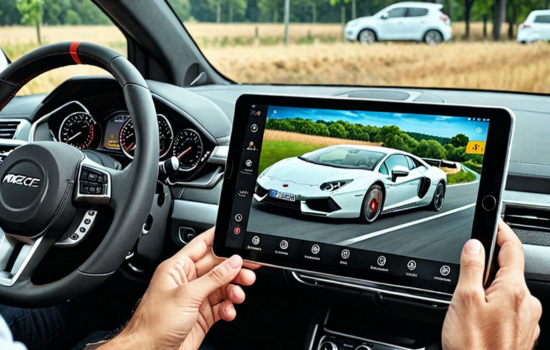Advertisements
Automotive mechanics can seem like a complicated world, full of parts, tools, and terms that are difficult to understand.
However, learning about engines, transmissions, and electrical systems doesn't have to be an impossible challenge. In this article, we'll show you how you can gain knowledge about mechanics in a simple and entertaining way, even if you have no prior experience.
Advertisements
Why Learn Automotive Mechanics?
Learning automotive mechanics is not only useful for those who want to work in the field, but also for anyone who owns a vehicle. Here are some reasons to encourage you to learn more about this topic:
- Saving money: With basic mechanical knowledge, you will be able to identify and solve problems without having to go to the workshop for any minor inconvenience.
- Increased security: Knowing how your car works will help you detect faults before they become serious problems.
- Independence: You won't be dependent on mechanics for simple tasks like changing the oil, replacing a battery, or adjusting a belt.
- Job opportunities: If you are passionate about mechanics, you can turn this knowledge into a career or even your own business.
- Longer vehicle life: With proper maintenance, you can extend the life of your car and avoid costly repairs.
- Personal satisfaction: Understanding how your vehicle works and troubleshooting it yourself can be a rewarding experience.
Advertisements
See also
- Learn about Automotive Mechanics by Playing
- Learn Mechanics by Playing: Games to Become an Expert
- 5G on your mobile: complete guide to activate it and enjoy it
- Free WiFi Without Complications: Save Data and Browse Without Limits
- Mobile phone full? Complete guide to free up space now
Ways to Learn Automotive Mechanics
There are various ways to acquire knowledge in mechanics, from professional courses to self-taught methods. Here are some of the best options:
1. Online Courses
Currently, there are many platforms offering automotive mechanics courses, both free and paid. Some of the best ones include:
- Coursera: It has basic courses on automotive engines and systems.
- Udemy: Provides specialized training in repair and maintenance.
- YouTube: Many mechanics share detailed step-by-step tutorials.
- Platzi: Learning platform with courses on basic and advanced mechanics.
2. Books and Manuals
If you prefer traditional learning, there are very comprehensive books on mechanics. Some recommended titles include:
- Automotive Mechanics for Beginners by Jeffrey Frank Jones.
- Car Engines by Joseph Heitner.
- Car Manual by Robert Bosch.
- How the Car Works by Tom Newton, ideal for beginners.
3. Mobile Applications to Learn Mechanics
There are applications designed to teach mechanics in an interactive way. Some of the most useful ones are:
- Car Mechanic Simulator: A game where you can repair and restore cars.
- Torque Pro: It helps you analyze the engine performance using an OBD2 scanner.
- AutoMate: Provides information on vehicle maintenance.
- OBD Fusion: Allows you to diagnose mechanical problems using an OBD2 adapter.
- Drivvo: Helps you manage your vehicle's maintenance and keep track of expenses.
4. Practice with a Real Car
There's no substitute for hands-on experience. If you have access to an old car, you can take apart simple parts like spark plugs, air filters, or brakes to understand how they work. Make sure you have the right tools and follow reliable guides.
5. Face-to-face classes and workshops
If you want a more hands-on, guided experience, you can enroll in classes at technical institutes or automotive training academies. These courses often offer certifications that can help you find employment in the industry.
6. Online Communities and Forums
Joining communities of mechanics and car enthusiasts can be a great way to learn. Some recommended forums are:
- ForoCoches: Community with discussions about mechanics and car repair.
- Reddit r/Justrolledintotheshop: To learn about real cases of car repairs.
- Specialized forums for specific brands: Ideal for learning about specific vehicle models.
Basic Concepts of Automotive Mechanics
If you are just starting out, it is important to know the basic elements of a vehicle. Here we explain some of the most important ones:
1. Engine and Combustion System
The engine is the heart of the car. It works by converting fuel energy into motion. Its main parts include:
- Cylinders: Where fuel combustion occurs.
- Pistons: They move inside the cylinders to generate force.
- Camshaft: Controls the opening and closing of valves.
- Crankshaft: Converts the linear motion of the pistons into a rotary motion.
2. Transmission
It is the system that transfers power from the engine to the wheels. It can be:
- Manual: It requires the driver to shift gears using a clutch.
- Automatic: Automatically shifts gears based on speed and acceleration.
- CVT: Continuously variable transmission type that improves fuel efficiency.
3. Brake System
Brakes are essential for safety. There are two main types:
- From disk: They use discs and pads to stop the car.
- Drum: More common in older vehicles, they work with shoes inside a drum.
- ABS (Anti-lock Braking System): Prevents wheels from locking when braking suddenly.
4. Electrical System
It controls functions such as the ignition, lights, battery and alternator. Some key components are:
- Battery: Provides electricity to the car.
- Alternator: Recharges the battery and powers the electrical systems.
- Fuses: They protect electrical circuits from overloads.
- Ignition system: Includes spark plugs and coils that generate the spark for combustion.
5. Suspension and Steering
They allow for smooth and safe handling. They include:
- Shock absorbers: They absorb impacts on the road.
- Kneecaps: They connect the suspension to the wheels.
- Steering rack: Allows you to turn the steering wheel easily.
- Stabilizer bars: They improve the stability of the car when cornering.

Conclusion
Learning automotive mechanics isn't as complicated as it seems. With the right combination of theory, practice, and digital tools, anyone can gain knowledge about how vehicles work. Whether you want to save money on repairs, improve your safety on the road, or even become a professional mechanic, you now have a clear path to get started. Let's get started!






